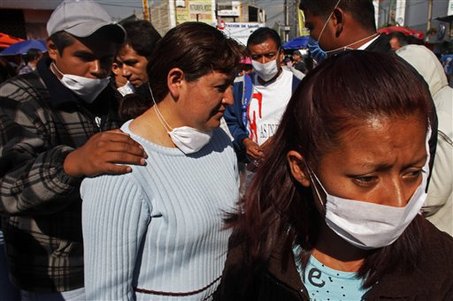 <<< Pigs at a farm seen posing for camera (file photo).
<<< Pigs at a farm seen posing for camera (file photo).
Nassau, Bahamas: Health officials were racing around the world alerting members of the public of the latest outbreak of the Swine Flu virus now beginning to spread in the United States. With 40 cases now reported in the United States, President Barack Obama said there was reason for concern but not yet “a cause for alarm.”
Bahamas Press received reports just last night that some 4 Mexican citizens had landed at the Bimini Bay Resort on Friday. It is further being reported to us that some 3 three cases of an unknown sickness have now surfaced on that island. A source said the persons infected with flu like symptoms are believed to have cases of tuberculosis. But could this be the new virus? Perhaps this is why members of the health department in the Bahamas went on high alert, and call a press conference on Sunday. But we believe that serious concerns should now take focus on Bimini. The island is small with some 5,000 people max. And any outbreak or risks there can be devastating.
Dr. Richard Besser, acting director of the Centers of Disease Control and Prevention, said that so far the disease in the United States seems less severe than the outbreak in Mexico, where more than 1,600 cases have been reported and where the suspected death toll has climbed to 149. No deaths have been reported in the U.S, and only one hospitalization.
Besser told reporters at CDC’s headquarters in Atlanta. He raised the possibility of more severe cases in the United States.
“We are taking it seriously and acting aggressively,” Besser said. “Until the outbreak has progressed, you really don’t know what it’s going to do.”
The U.S. stepped up checks of people entering the country by air, land and sea.
And Besser said a new U.S. travel advisory was being prepared suggesting “nonessential travel to Mexico be avoided.”
The confirmed cases announced on Monday were double the 20 initially reported by the CDC. Besser said this was due to further testing — not further spreading of the virus — in New York at a school in Queens, bringing the New York total to 28.
<<< Persons lineup in Mexico panic at outbreak of Swine flu.








U.S. Swine Flu Cases Jump
CaribWorldNews, NEW YORK, NY, Weds. April 29, 2009: The number of reported swine flu cases in the U.S. jumped Tuesday to 64, with New York City having the highest number of cases, according to the Center of Disease Control.
Those affected with the virus in New York have now been put at 45, according to the CDC. Each affected person has some link to the St. Francis Preparatory school or to Mexico, according to the city’s Department of Health.
There were ten cases reported in California, 6 in Texas, 2 in Kansas and one in Ohio.
On Tuesday, the organization warned it has activated its emergency operations center to coordinate the agency’s emergency response.
The swine influenza virus is susceptible to the prescription antiviral drugs oseltamivir and zanamivir.
There are everyday actions people can take to stay healthy. These include cover your nose and mouth with a tissue when you cough or sneeze. Throw the tissue in the trash after you use it; wash your hands often with soap and water, especially after you cough or sneeze. Alcohol-based hand cleaners are also effective and avoid touching your eyes, nose or mouth.
@Karen
Well Karen the government of the Bahamas is monitoring all ports of entry. As it stands according to the Ministry of Health and its minister there has been NO reported cases of the Swine Flu in the Bahamas. We at Bahamas Press have also NOT heard of any confirmed cases, but if we do, it certainly will be reported on here.
I would say however we have heard of confirmations in the UNITED STATES, as reported on CNN. For us here in the Bahamas that’s scary.
Bahamas Press/Editor
Were going to Bahama’s in May and would like to know what is going on there with the Flu. This has me really concerned. Spend that kind of money and have a bad trip with sickness all over. If anyone hears of anything on Bahama’s please let me know.
Thanks
Swine Flu Q & A
What you need to know and how to help protect yourself from infection.
By the Editors of MSN Health
(© Getty Images)
Swine flu in the U.S.? If you’re worried about the flurry of news on pandemics, epidemics, and public health emergencies, here are some key facts provided by the U.S. Centers for Disease Control and Prevention to help you understand how swine flu is spread and what you can do to help prevent infection. Current updates on the spread of swine flu are available at the CDC’s Swine Flu Web site.
What is swine flu?
Swine flu is a respiratory disease normally found in pigs and caused by type A influenza viruses. While outbreaks of this type of flu are most common in pigs, human cases of swine flu do happen. In the past, reports of human swine flu have been rare—approximately one infection every one to two years in the United States. From December 2005 through February 2009, only 12 cases of human infection were documented.
How is it spread?
Humans with direct exposure to pigs are those most commonly infected with swine flu. Human-to-human spread of swine flu viruses have been documented; however, it’s not known how easily the spread occurs. Just as the common flu is passed along, swine flu is thought to be spread by coughing, sneezing, or touching something that has the live virus on it.
If infected, a person may be able to infect another person one day before symptoms develop; therefore, a person is able to pass the flu on before they know they are sick. Infected individuals may spread the virus for seven or more days after becoming sick. Those with swine flu should be considered potentially contagious as long as they are showing symptoms, and up to seven days or longer from the onset of their illness. Children might be contagious for longer periods of time.
Can I catch swine flu from eating pork?
No. The CDC says that swine flu viruses are not transmitted by food. Properly cooking pork to an internal temperature of 160°F kills all bacteria and viruses.
What are the symptoms of swine flu?
Symptoms of swine flu are similar to those of a regular flu: fever and chills, sore throat, cough, headache, body aches, and fatigue. Diarrhea and vomiting can also be present. Without a specific lab test, it is impossible to know whether you may be suffering from swine flu or another flu strain, or a different disease entirely.
What precautionary measures should I take?
The same everyday precautions that you take to prevent other contagious viruses should be used to protect yourself against swine flu. “The best current advice is for individuals to practice good hand hygiene. Periodic hand washing with soap and water, or the use of an alcohol-based hand sanitizer when hand washing is not possible, is a good preventive measure. Also, avoid touching your eyes, nose or mouth, as germs can more easily gain entrance into your body through those areas,” suggests Rob Danoff, D.O., an MSN health expert. Covering your mouth with a disposable tissue when you cough and sneeze is also a good practice.
The CDC recommends avoiding contact with sick people and keeping your own good health in check with adequate sleep, exercise, and a nutritious diet.
What should you do if you think you are sick with swine flu?
Contact your health care professional, inform them of your symptoms, and ask whether you should be tested for swine flu. Be prepared to give details on how long you’ve been feeling ill and about any recent travels. Your health care provider will determine whether influenza testing or treatment is needed. If you feel sick, but are not sure what illness you may have, stay home until you have been diagnosed properly to avoid spreading any infection.
Watch for these symptoms in children. Seek emergency medical care if your child experiences any of the following warning signs:
* Fever with a rash
* Dehydration
* Fast breathing
* Bluish skin coloration
* Slow to wake or sluggish interaction
* Flu-like symptoms improve, but then return and cough worsens
* Severe irritability
For adults, emergency medical care is needed if you experience these warning signs:
* Difficulty breathing
* Dizziness
* Confusion
* Severe or persistent vomiting
* Pain or pressure in the chest or stomach
Remember that the symptoms for swine flu are almost identical to those you might experience with the regular flu. Only your doctor can give you the correct diagnosis.
Are there medicines effective in treating swine flu in humans?
The current strain of the swine flu appears to respond to the use of oseltamivir (Tamiflu), or zanamivir (Relenza) for those infected. For treatment, these antiviral drugs work best if started soon after getting sick (within two days of the appearance of symptoms), and for that reason, it’s important to notify your health care provider right away if your symptoms are severe.
Are there a vaccine available to protect against swine flu?
No, there is no vaccine to protect humans from this new strain of swine flu. Steps have been taken to start developing one, though the process is complex and can take months.
Would a recent vaccination for the seasonal flu help protect against swine flu?
The CDC reports that those individuals who received the seasonal flu vaccine do not have added protection against the swine flu. The human H1N1 viruses are very different from the H1N1 viruses responsible for the recent outbreaks of swine flu. Therefore, a seasonal flu vaccine would not protect against the swine flu.
More information
* U.S. Centers for Disease Control and Prevention
* Infectious Diseases: How they spread and how to stop them
Be careful with this isssue, don’t forget we rely on tourism…Panic scares…
Thanks Trinity I found some sites but note that BP is moderating.I now know what to look for and am sure others will find this useful as well.
You can can google it and find out more…..but the media has to let people know and put them on alert as this is serious…
I read an article earlier today….
What is Swine Influenza?
Swine Influenza (swine flu) is a respiratory disease of pigs caused by type A influenza virus that regularly causes outbreaks of influenza in pigs. Swine flu viruses cause high levels of illness and low death rates in pigs. Swine influenza viruses may circulate among swine throughout the year, but most outbreaks occur during the late fall and winter months similar to outbreaks in humans. The classical swine flu virus (an influenza type A H1N1 virus) was first isolated from a pig in 1930.
What are the symptoms of swine flu in people?
The symptoms of swine flu, which are similar to symptoms of regular flu, include fever, cough, sore throat, body aches, headache, chills and fatigue. Some people have reported diarrhea and vomiting associated with swine flu.
Since my earlier post I have researched and found the following information which might assist all of,check these links :
http://www.msnbc.msn.com/id/30398682/?GT1=43001
http://health.msn.com/health-topics/articlepage.aspx?cp-documentid=100237427>1=31036>1=31036
Very informative information that should be copied fpr all families.
I hear lots of talk about screening of visitors to the Bahamas but have yet to hear anyone say what the symptoms are.I know of flu symptoms but woulds love for someone to explain what one should look for.I will go to internet and try and find out what I should observe.Anyone else has any information?
The little small island of BIMINI would be in lots of troubles if the MEXICANS that came to BIMINI was not properly checked.LORD hear our pray and help us.
Comments are closed.